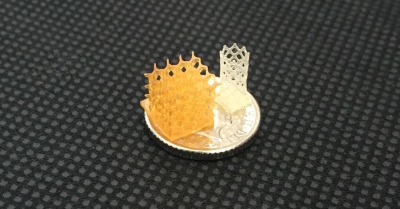
Transport
Apr 25 2024
Birmingham Airport (BHX) has achieved Level 3 (optimisation) of the Airport Carbon Accreditation (ACA) scheme for a second year.
Read more
Research published today (5 July) has demonstrated the viability of 3D-printed tissue scaffolds that harmlessly degrade while promoting tissue regeneration following implantation.
The scaffolds showed highly promising tissue-healing performance, including the ability to support cell migration, the ‘ingrowth’ of tissues, and revascularisation (blood vessel growth).
Professor Andrew Dove, from the University of Birmingham’s School of Chemistry, led the research group and is the lead author on the paper published in Nature Communications, which characterises the physical properties of the scaffolds, and explains how their ‘shape memory’ is key to promoting tissue regeneration.
Professor Dove commented:
The scaffolds have evenly distributed and interconnected pores that allow diffusion of nutrients from surrounding tissues.
The shape memory means this structure is retained when the scaffold is implanted into tissues, and this supports the infiltration of cells into the scaffold while encouraging tissue regeneration and revascularisation.
The scaffolds were created using 3D printing resin ‘inks’ developed during a major programme of biomaterials research led by Professor Andrew Dove at the University of Birmingham and Warwick University.
The resins are being commercialised under the tradename 4Degra™ by 4D Biomaterials, a spinout from University of Birmingham Enterprise and Warwick Innovations that was launched in May 2020.
The scaffolds showed several major advantages over current approaches used to fill soft tissue voids that remain after trauma or surgery, including sufficient elasticity to conform to irregular spaces, the ability to undergo compression of up to 85% before returning to their original geometry, compatibility with tissues, and non-toxic biodegradation.
The paper describes several compositions for the 4Degra™ resins that enable materials of a wide range of strengths to be manufactured.
The researchers showed that the materials were non toxic to cells and they also performed mechanical testing to ensure the scaffolds could regain their shape, geometry and pore size after compression, and performed tests that showed the scaffolds can fill an irregular shaped void in alginate gel which was used as a mimic of soft tissue.
Laboratory studies demonstrated that the scaffold degrades by surface erosion into non-acidic products, which means the scaffold structure allows for slow, continuous tissue infiltration.
Professor Dove said:
3D printed materials have received a lot of attention in the tissue engineering world. However void-filling materials to provide mechanical support, biocompatibility, and surface erosion characteristics that ensure consistent tissue support during the healing process, and this means a fourth dimension (time) needs to be considered in material design.
We have demonstrated that it’s possible to produce highly porous scaffolds with shape memory, and our processes and materials will enable production of self-fitting scaffolds that take on soft tissue void geometry in a minimally invasive surgery without deforming or applying pressure to the surrounding tissues.
Over time, the scaffold erodes with minimal swelling, allowing slow continuous tissue infiltration without mechanical degradation.
4D Biomaterials has made fast progress in scaling up production of the 4Degra™ resin-inks at its laboratory in MediCity, Nottingham, now offering technical grade material for commercial supply to 3D printing companies and medical device manufacturers.

Transport
Apr 25 2024
Birmingham Airport (BHX) has achieved Level 3 (optimisation) of the Airport Carbon Accreditation (ACA) scheme for a second year.
Read more
Global
Apr 24 2024
World-leading materials science and technology consultancy Lucideon is targeting international growth with expansion in the Japanese market.
Read more
Global
Apr 18 2024
The Midlands Engine Partnership will host a Pavilion for the very first time at this year’s UK Real Estate Infrastructure Investment Forum [21-23 May], providing regional partners with a platform to showcase their investment propositions, worth in excess of £42bn, to a global audience.
Read more